Table Of Contents
Finding the perfect family-friendly neighborhood in New York City feels like solving an impossible puzzle. You're juggling school quality with commute times, weighing playground access against apartment size, and trying to stretch your budget across five boroughs that each offer something different for families.
As an NYC moving company that specializes in helping families navigate NYC relocations, we at Lifestyle Moving & Storage see this challenge every day. Parents call us with spreadsheets comparing school ratings, commute maps marked up in different colors, and wish lists that seem to grow longer with each conversation. The good news? NYC has more family-friendly neighborhoods than ever before, and finding your perfect fit is absolutely possible with the right information.
How We Picked These Neighborhoods
When we recommend family-friendly NYC neighborhoods, we consider the same priorities we hear from parents daily:
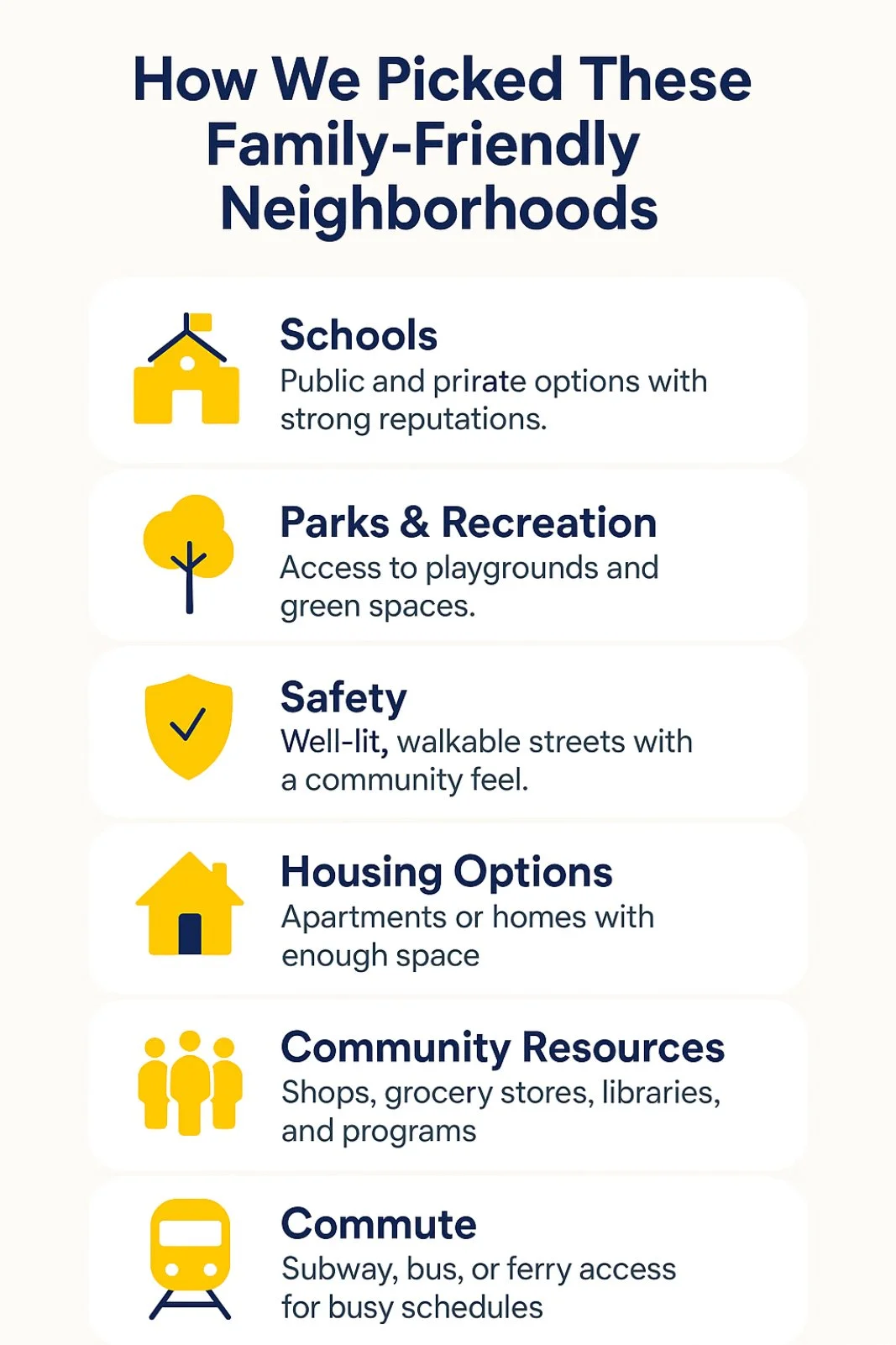
- Schools: public and private options with strong reputations.
- Parks & Recreation: access to safe playgrounds, green spaces, and activities.
- Safety: well-lit streets, community feel, and walkability.
- Housing Options: apartments and homes with enough space for growing families.
- Community Resources: family-oriented shops, grocery stores, libraries, and after-school programs.
- Commute: subway, bus, or ferry access that fits busy family schedules.
These are the criteria families moving with us in NYC tell us matter most and the foundation for the neighborhoods below.Check which schools your potential neighborhood is zoned for — explore the NYC DOE school zone map right here.”
Check which schools your potential neighborhood is zoned for - explore the NYC DOE school zone map right here.
Best Neighborhoods for Family Life in NYC
Park Slope, Brooklyn: The Gold Standard for Family Living

Park Slope continues to earn its reputation as one of the most family-friendly NYC neighborhoods for good reason. Those iconic brownstones aren’t just Instagram-worthy, they offer the space growing families need, often with private gardens that feel like luxury in NYC.
Parents considering Park Slope as their new neighborhood - check out this page, for more parent-oriented info.
Prospect Park serves as the neighborhood's backyard, providing year-round activities from ice skating in winter to baseball leagues in summer. The Saturday farmer's market becomes a social hub where parents coordinate playdates while kids sample free fruit samples. Seventh Avenue's shopping corridor means you can accomplish most errands on foot, a massive advantage when you're managing school pickup schedules and after-school activities.
The school options here consistently rank among the city's best, and the community support system is remarkable. New parents quickly discover networks of families ready to share babysitter recommendations, discuss school applications, and organize everything from block parties to snow day childcare swaps.
Pros:
- Excellent public schools and community networks
- Prospect Park as a “backyard”
- Walkable shopping and dining
Cons:
- Higher rents than other Brooklyn neighborhoods
- Limited parking options
Upper West Side, Manhattan: Cultural Richness Meets Family Convenience
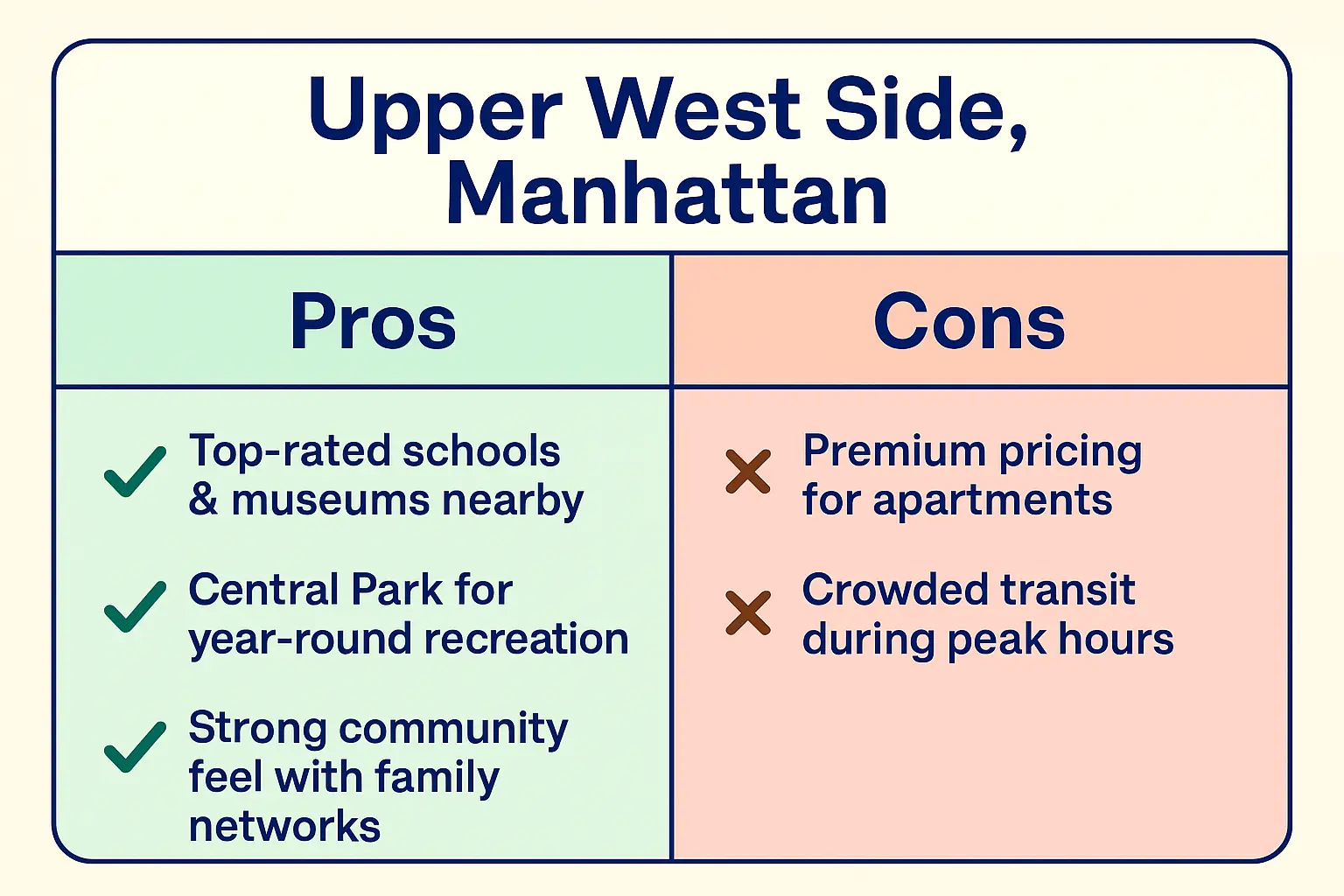
Living on the Upper West Side means your children grow up thinking it's normal to spend Saturday afternoons at the Natural History Museum or catch free concerts in Central Park. This neighborhood offers an unmatched combination of cultural resources and family infrastructure.
The best places to live in NYC with kids often feature excellent public transportation, and the Upper West Side delivers with multiple subway lines and crosstown bus routes. Parents working in Midtown can maintain reasonable commutes while giving their children access to some of the city's finest educational and cultural opportunities.
Central Park becomes your extended living room here. Whether it's weekend bike rides around the reservoir, winter sledding adventures, or summer picnics on the Great Lawn, the park provides space and activities that would be impossible to replicate in most other major cities. The neighborhood's tree-lined streets and pre-war buildings create a sense of permanence that many families find appealing.
Pros:
- Top-rated schools and museums nearby
- Central Park for year-round recreation
- Strong community feel with family networks
Cons:
- Premium pricing for apartments
- Crowded transit during peak hours
Astoria, Queens: Diversity and Affordability in Balance
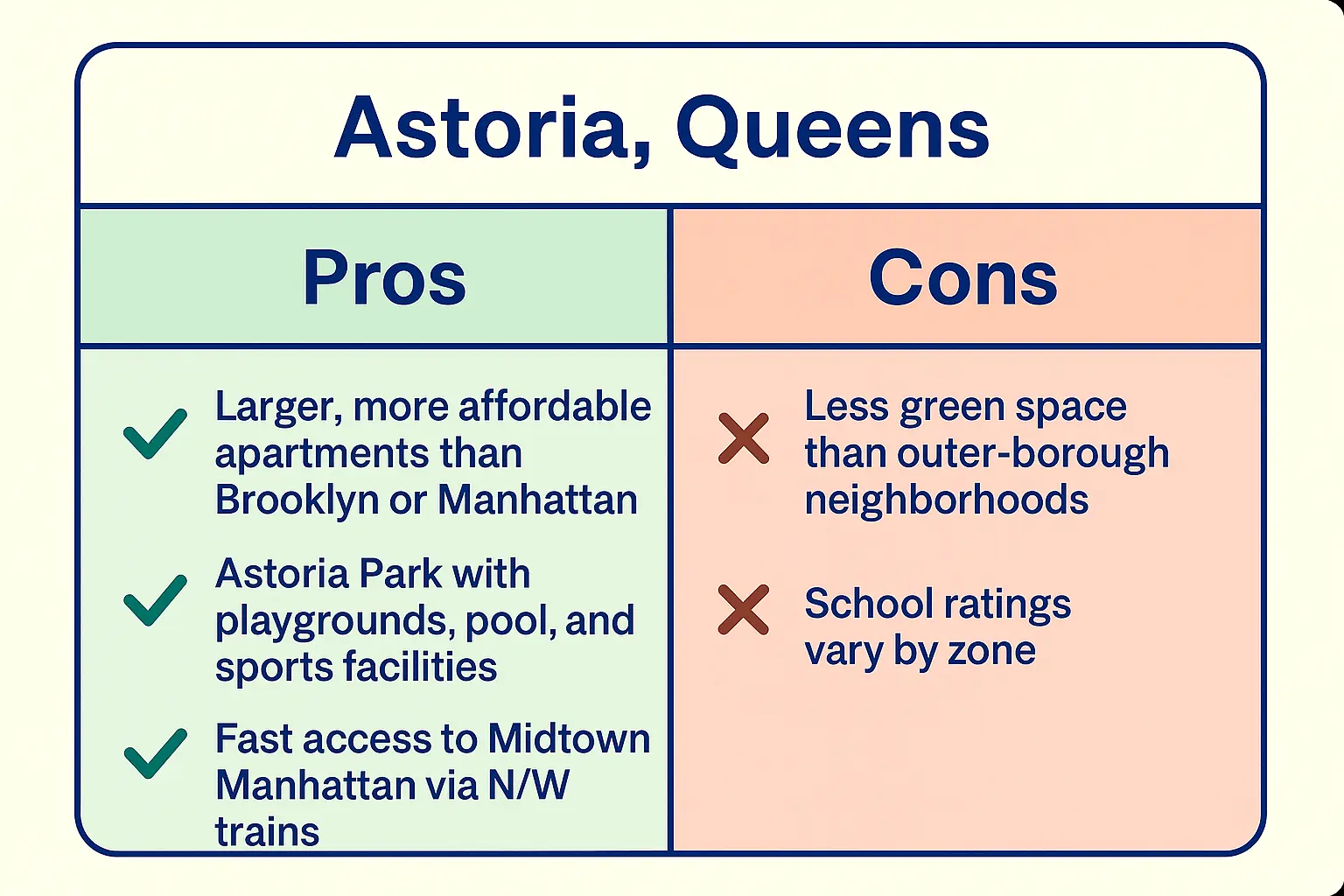
Astoria offers something increasingly rare in NYC: authentic diversity that enriches daily life rather than just existing on paper. Children here grow up hearing multiple languages at the playground, tasting cuisine from around the world, and developing the kind of cultural fluency that serves them well throughout life.
The family neighborhoods Brooklyn often get more attention, but Astoria provides comparable family resources at more manageable price points. Apartments tend to be larger, often with outdoor space that's genuinely usable. The N and W trains provide direct access to Manhattan, while local buses connect to other Queens neighborhoods efficiently.
Astoria Park deserves special mention – its 59 acres include NYC's oldest public pool, tennis courts, and playgrounds that serve families from across the borough. The Sunday farmer's market reflects the neighborhood's international character, offering everything from traditional Greek pastries to Bangladeshi vegetables.
Pros:
- Larger, more affordable apartments than Brooklyn or Manhattan
- Astoria Park with playgrounds, pool, and sports facilities
- Fast access to Midtown Manhattan via N/W trains
Cons:
- Less green space than outer-borough neighborhoods
- School ratings vary by zone
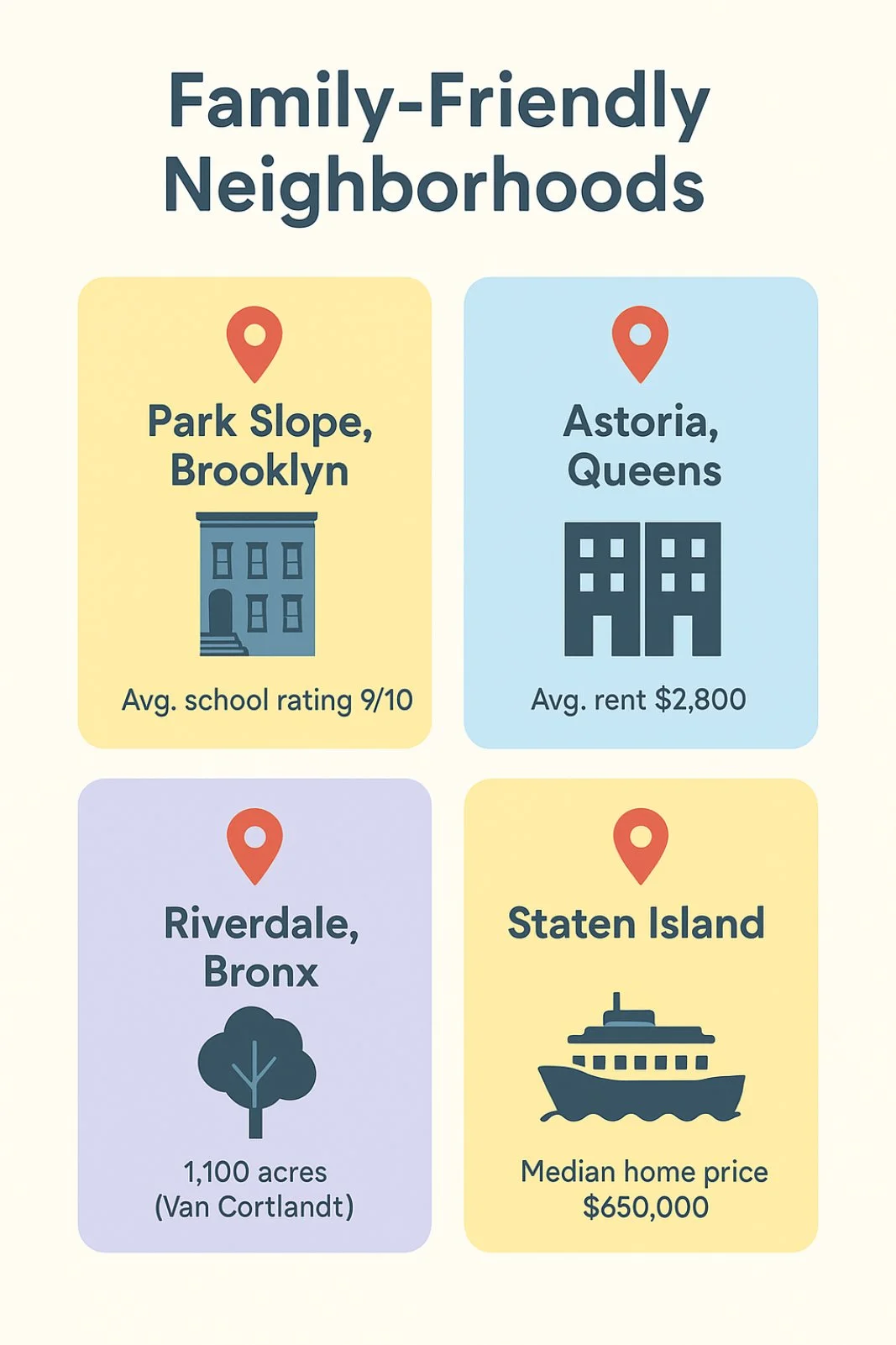
Riverdale, Bronx: Suburban Living Within City Limits
Riverdale surprises families who assumed they'd need to leave NYC entirely to find suburban-style living. This Bronx neighborhood offers larger apartments, private outdoor space, and a slower pace while maintaining subway connections to Manhattan.
The area appeals particularly to families considering private schools. Several excellent institutions call Riverdale home, and the neighborhood's residential character provides a supportive environment for academic focus. Parents appreciate the balance: children can walk to school safely, play in actual yards, and still access the cultural and professional opportunities that define NYC living.
Van Cortlandt Park, one of the city's largest, provides hiking trails, golf courses, and recreational facilities that serve active families year-round. The park's size means you can find quiet spaces even on busy weekends, something increasingly valuable as children develop their own interests and activity schedules.
Pros:
- Suburban feel with NYC access
- Strong private school options
- Van Cortlandt Park for outdoor activities
Cons:
- Longer commute times to Midtown
- Limited nightlife and dining compared to other boroughs
Staten Island: Space and Community for Growing Families
Staten Island offers the most space per dollar of any NYC borough, making it particularly attractive for families planning to grow or needing room for multiple children. The borough's suburban character includes actual driveways, front yards, and the kind of neighborhood feel that many parents remember from their own childhoods.
Safe NYC neighborhoods for families often feature strong community connections, and Staten Island delivers through excellent local schools, youth sports leagues, and family-oriented community events. The Staten Island Ferry provides a unique commute option, though families should carefully consider travel times to Manhattan jobs.
The borough's parks and beaches offer recreational opportunities unavailable elsewhere in NYC. Great Kills Park provides hiking trails and beach access, while Historic Richmond Town offers educational programs that make local history come alive for children.
Pros:
- Affordable family homes with yards and driveways
- Excellent community schools and youth sports leagues
- Beaches and large parks for outdoor life
Cons:
- Longer commutes to Manhattan
- Reliance on ferries and bridges
👉 Need more family moving tips? Explore these articles:
Forest Hills, Queens: Tree-Lined Streets and Strong Schools
Forest Hills combines the best aspects of suburban living with NYC convenience. The neighborhood's tree-lined streets and Tudor-style homes create a storybook setting that appeals to families seeking visual charm alongside practical amenities.
The school districts here consistently earn high ratings, and the community's commitment to education shows in everything from well-maintained playgrounds to active parent-teacher organizations. Austin Street provides walkable shopping and dining options, while the nearby Queens Botanical Garden offers year-round educational programming for children.
Tennis enthusiasts particularly appreciate Forest Hills, home to the US Open and numerous public courts. The neighborhood's commitment to recreational facilities extends to multiple playgrounds, each designed for different age groups and interests.
Pros:
- Top-rated public schools
- Strong community and PTA support
- Walkable shopping on Austin Street
Cons:
- Higher costs than nearby Queens neighborhoods
- Limited rental inventory
Battery Park City, Manhattan: Modern Family Living with Historic Views

Battery Park City represents NYC's newest approach to family-friendly neighborhood design. Built with intention rather than evolved organically, this waterfront community provides modern amenities specifically planned around family needs.
The esplanade offers unparalleled water views and safe cycling paths, while multiple playgrounds serve different age groups. The neighborhood's newer construction means larger apartments, better storage, and family-friendly building amenities like children's playrooms and outdoor terraces.
Schools here benefit from both newer facilities and smaller class sizes. The community's planned nature creates natural gathering spaces where families connect easily. Parents particularly appreciate the separation from vehicle traffic – children can move safely throughout much of the neighborhood.
Pros:
- Larger apartments with family amenities
- Multiple playgrounds and cycling paths
- Strong sense of safety and community
Cons:
- Premium pricing for newer buildings
- Less “old NYC” character compared to other neighborhoods
Choosing Your Family’s Perfect NYC Neighborhood
The decision comes down to balancing your unique priorities:
- Commute vs. Space: Shorter work commutes may mean smaller apartments.
- Budget vs. Amenities: Higher rents may be offset by free parks and walkable groceries.
- Present vs. Future Needs: Will a one-bedroom work now, but not when you add a second child?
Families often compare NYC neighborhoods with nearby suburbs like Westchester or New Jersey. Both have advantages, the key is finding what fits your lifestyle best.
Timing Your Family Move Like a Pro
Moving with kids in NYC requires strategic timing:
- Summer Moves: Align with school calendars but mean higher demand and prices.
- Mid-Year Moves: Less competition, but kids may face adjustment challenges.
- Holiday Moves: Sometimes offer better moving rates but can disrupt family routines.
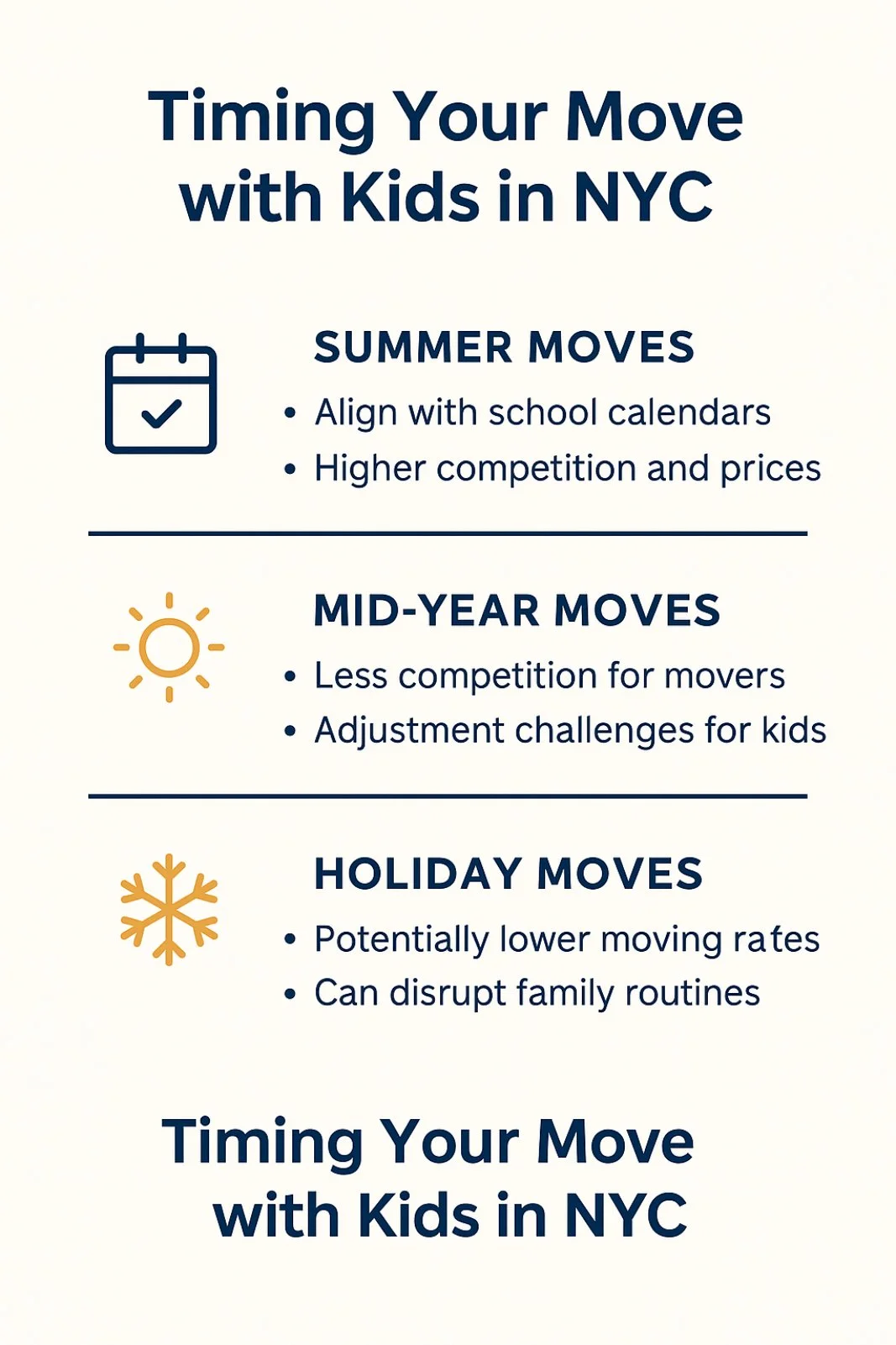
We’ve seen that planning early makes all the difference. Family moves require more logistics: multiple bedrooms, larger furniture, school transfers, and coordinating kids’ schedules. Temporary storage is often essential to keep things manageable, whether downsizing, upsizing, or bridging lease gaps.
Our Family-First Approach at Lifestyle Moving & Storage
At LMS, we know family moves are about more than logistics, they’re about helping parents and kids transition smoothly into new lives. That’s why we:
- Coordinate timing around school schedules.
- Handle oversized furniture and family-sized packing.
- Offer storage solutions for transitional periods.
- Communicate proactively, so parents can focus on their children instead of moving stress.
From brownstone moves in Park Slope to high-rise relocations in Battery Park City, we’ve developed solutions for the quirks of every borough. Narrow staircases, parking restrictions, and building policies are challenges we plan for, not surprises.
Your Next Chapter Starts Here
New York City’s family-friendly neighborhoods offer incredible diversity in lifestyle, budget, and community character. Whether you’re drawn to Park Slope’s brownstone charm, Astoria’s cultural richness, or Staten Island’s suburban space, your family’s perfect neighborhood is here.
The key is matching your needs with the right community and moving with a team that understands what families require.
Ready to make your move? Contact Lifestyle Moving & Storage for a family-focused consultation. Our experienced team specializes in helping families navigate NYC’s neighborhoods, ensuring your transition supports your family’s success from day one.
Get your personalized family moving quote today and take the first step toward your next chapter in New York City.




.webp)